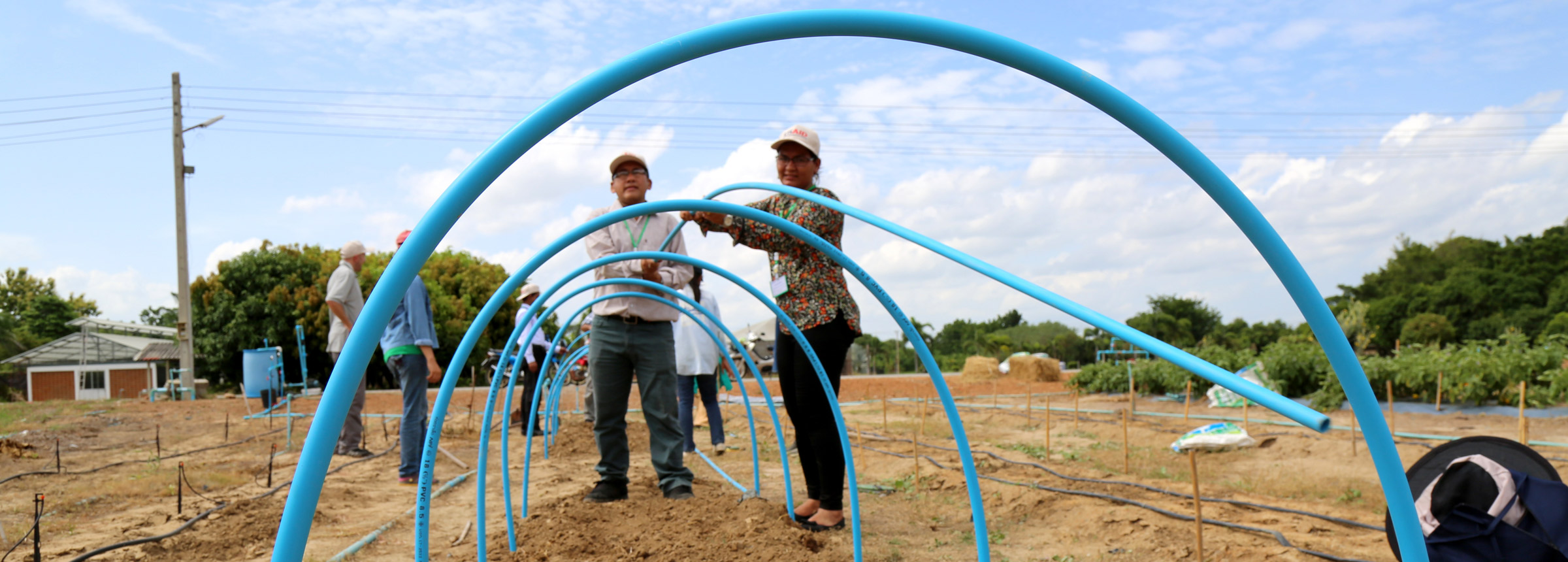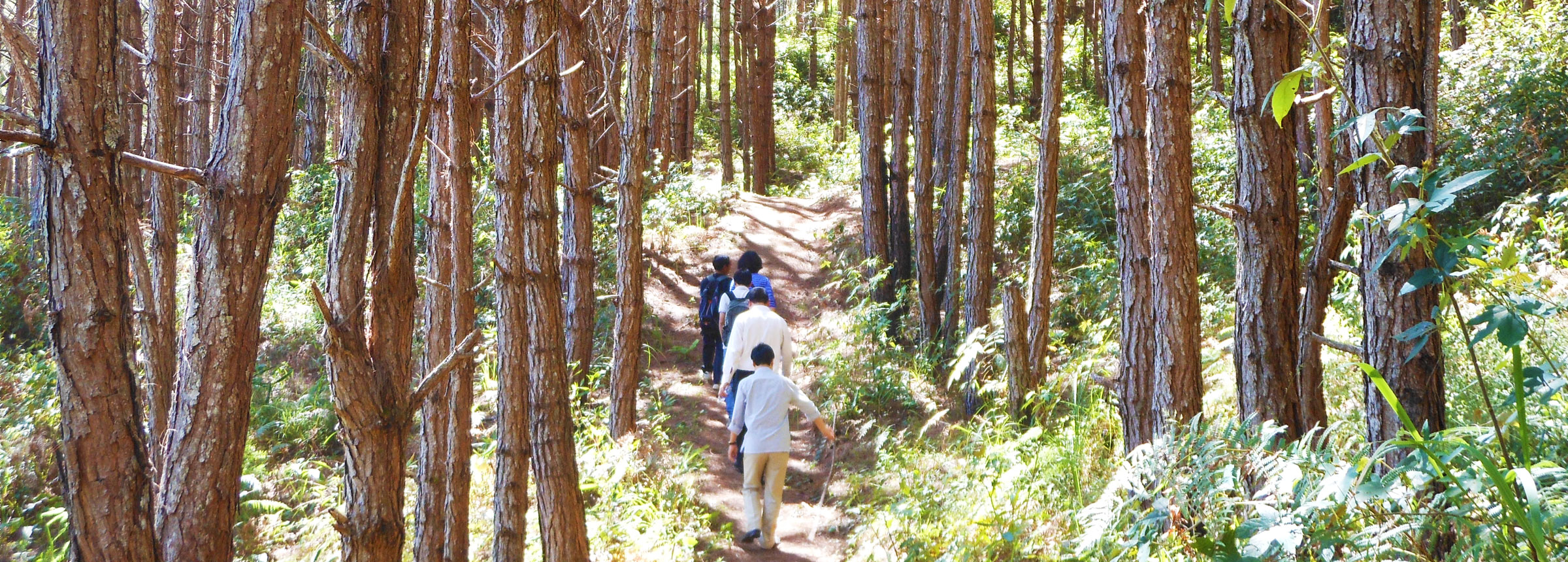
Winrock and Kasetsart
An Enduring Partnership since 1955
A Winrock Legacy Story
Winrock International’s connection with Thailand’s Kasetsart University began before Winrock itself. Only 12 years after Kasetsart was established in 1943, one of Winrock’s founding organizations, the New York City-based Agricultural Development Council (then known as the Council on Economic and Cultural Affairs), began helping Kasetsart University form an agricultural economics program.
It was the beginning of a relationship that has borne fruit for decades, currently through Kasetsart’s collaboration with USDA Thailand Regional Agriculture Innovation Network (#thaiRAIN), implemented by Winrock, which is improving agricultural yields and farmer’s income through the adoption of climate-smart innovations by 30,000 smallholders in Thailand and Southeast Asia.
#thaiRAIN has been working with multiple academic units of the universities, including most primarily Kasetsart’s International College, Departments of Soil Science, Horticulture under the Faculty of Agriculture, and Faculties of Economy and Environment. Many KU experts form #thaiRAIN’s Audit Panel, which have led in the project’s process of sourcing and validating climate-smart innovations.
“Our team at Kasetsart University believes that #thaiRAIN comes at the right time and place. Thailand’s agriculture value chain needs and will benefit from more appropriate climate-smart innovations. We are very pleased that Kasetsart and Winrock continue to collaborate. The fruit of this partnership is apparent in the evidence panel, whose science-based sourcing methodology serves as the gateway for these innovations to enter #thaiRAIN’s radar,” quotes Assoc. Prof. Dr. Witsanu Attavanich, Faculty of Economics.
Dr Attavanich received Winrock International’s endorsement for the USDA Cochran fellowship selection.
A Long History of Collaboration

Collaboration has been a constant between Kasetsart and Winrock and its founding organization. Kasetsart was A/D/C’s principal partner in Thailand and its sponsoring institution when it decided to open an office in Bangkok.
For three decades, from 1955 to 1985, A/D/C, which was founded by John D. Rockefeller III in 1953, built agricultural and social science expertise in Thailand and other Asian nations from the inside out. This included the training of more than 60 Thai scholars, most of them from Kasetsart, who received Ph.D.’s and master’s degrees in the United States and then returned home to use their expert knowledge for the good of their home countries and institutions.
One example is the late A/D/C fellow Dr. Kamphol Adulavidhaya, who received a master’s degree from Oregon State University in 1962 and a Ph.D. from Purdue University in 1969. He became the president of Kasetsart University in 1992 and also served as president of the Agricultural Economics Society.
“The Council trained the trainers, and you can certainly see that at Kasetsart,” says Grace Tongue, who worked at A/D/C from 1966 to 1980 and visited Kasetsart in 1974 and several other times. “There’s evidence all over the university that the council was there.”
In addition to training Thai scholars, A/D/C sent American professors to Kasetsart to conduct research and provided grants for Kasetsart faculty to conduct small studies. And then there were the A/D/C associates, beginning with Dr. Clifton Wharton, who was the Thai associate from 1957 to 1964 and went on to become president of Michigan State University, CEO of TIAA-CREF and deputy secretary of state in the U.S.
The associate concept was the linchpin on which A/D/C’s development of homegrown expertise was built. Someone had to identify the scholars who would be receiving the fellowships, and that required an understanding of the country and its promising talent. The first Thai associate to live in Thailand was Russell Stevenson, who served from 1969-1970 and worked primarily with Kasetsart’s department of rural education. Another important Thai associate was Shao-er Ong, the first associate born in Asia (Nanking, China), who served from 1970 to 1977.
A/D/C saw its role as much broader than handing out scholarships; it was molding institutions, giving them the wherewithal to pursue their own Asian-centric scholarship and agenda. For that reason, there were publications and conferences, many of them held at Kasetsart.
By the early 1970s, A/D/C’s work had begun to bear fruit and there were social scientists actively pursuing their careers throughout Asia. There was a need for more cross-Asia study and idea exchange. A/D/C created an Asian Fellowship Program to meet these needs, setting up its headquarters in offices at Kasetsart University in 1971. The Asian Fellowship Program awarded master’s-level candidates graduate assistantships at Asian universities in countries other than their own. The program fostered relationships across the region, promoting collaboration on shared problems among researchers, academics and development practitioners. There were conferences and publications, and an interregional program was developed to support collaborative research, publications and professional meetings.
The Connection Continues
In 1985, A/D/C and two other Rockefeller founded organizations merged to create Winrock International. Winrock has continued to work with Kasetsart through the years. For instance, Winrock partnered with Kasetsart and other universities in the 1980s and ’90s as part of its Forestry/Fuelwood Research and Development Project. In 2004, Winrock created the John D. Rockefeller 3RD Scholars Program to continue the Rockefeller family’s longstanding commitment to building the capacity and leadership skills of scholars in emerging countries. The program promotes independent social science research and strengthens the analytical skills of young professionals, primarily in Asia. Research themes focus on the development challenges facing disadvantaged groups, including women, youth, ethnic minorities and low-income groups.

The program’s inaugural research team involved two Kasetsart professors. They joined colleagues from other institutions to investigate how the rural poor in Thailand and Vietnam can be compensated for protecting environmental services needed by urban residents, such as clean drinking water from forest watersheds. These payments for forest environmental services (PFES) can provide a sustainable livelihood for rural communities while protecting sensitive forest watersheds. The Kasetsart University researchers were Dr. Penporn Janekarnkij and Dr. Prapinwadee Sirisupluxana, from the Department of Agriculture and Resource Economics.
Kasetsart was also deeply involved in the development of a university-level climate change curriculum spearheaded by the USAID-funded Lowering Emissions in Asia’s Forests (LEAF) project (2011-2016). Kasetsart, along with two other Thai universities, was engaged in each stage of the process: assessing training needs, outlining the curriculum modules, developing curriculum materials, training the professors, and testing and revising the curriculum before rolling it out for further implementation. Kasetsart participated in multiple curriculum development events and, along with the other universities, led the process of curriculum development, expanding it to other universities in Thailand.
Later, the Winrock-Kasetsart partnership continued with additional collaboration between Winrock and Kasetsart following the success of the AIFA project.
AIFA worked with Kasetsart’s Horticulture Innovation Lab Regional Center, which provided research and development funds for such agricultural entrepreneurs as a spirulina production system that promises to be a source of food as well as a household income-producer and drying beads that
keep seeds and grain safe and dry.
“Our team at Kasetsart University believes that it is critical for social entrepreneurs, investors, government officials and food security experts to work together toward improving the lives of farmers and promoting food security,” says Dr. Poonpipope (Poon) Kasemsap, director of Kasetsart’s Horticulture Innovation Lab Regional Center and a critical contact during AIFA.
The partnership is thriving with the most recent U.S. Department of Agriculture-funded project, in which Kasetsart University plays a vital role since its inception. Even beyond #thaiRAIN’s completion in 2027, Kasetsart University is working with Winrock International to jointly establish a Sustainable Agrifood System Center of Excellence in Southeast Asia.
The Kasetsart-Winrock relationship is a story of true partnership that has stood the test of time, with clear inspiration and a roadmap that aims at sustainability in all senses of the word.
Related Projects

Feed the Future Asia Innovative Farmers Activity (AIFA)
Despite tremendous progress, farmers in Asia continue to grapple with two major challenges: food insecurity and poverty. By accelerating the transfer and adoption of innovative agricultural technologies, this USAID-funded Feed the Future program gives smallholders in South and Southeast Asia the knowledge and resources they need to grow more crops and earn more income.
